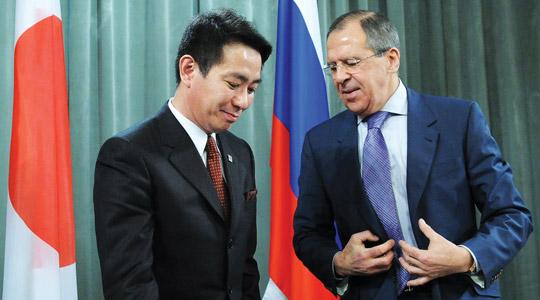Russian and Japanese diplomats held talks in Moscow on Monday in a bid to restart stalled negotiations over a territorial row that has kept the two neighbors from signing a World War II peace treaty and rejuvenating economic ties.
 Russian and Japanese diplomats held talks in Moscow on Monday in a bid to restart stalled negotiations over a territorial row that has kept the two neighbors from signing a World War II peace treaty and rejuvenating economic ties.
Russian and Japanese diplomats held talks in Moscow on Monday in a bid to restart stalled negotiations over a territorial row that has kept the two neighbors from signing a World War II peace treaty and rejuvenating economic ties.
The talks between Russian Deputy Foreign Minister Igor Morgulov and his Japanese counterpart Singuke Sugiyama follow an April trip to Moscow by Japan's Prime Minister Shinzo Abe.
The first high-level visit by a Japanese premier in a decade ended with Abe and Russian President Vladimir Putin agreeing to try to find a solution to the status of the Kuril Islands -- claimed by Tokyo despite being taken by the Soviet Red Army in 1945.
"As our leaders agreed, we are assuming the discussion of the main parameters and modalities for upcoming peace agreement negotiations," Russian news agencies quoted Morgulov as saying at the start of the meeting.
"We hope to move our joint work forward for the purpose of developing our partnership in the most varied fields."
Sugiyama replied that he hoped to "speed up the search for mutually-acceptable solutions".
"There is a feeling that we are close friends," Russia's state-run RIA Novosti news agency quoted Japan's vice minister for foreign affairs as saying.
"It would be good if we could conduct these consultations while sharing this new sentiment in our relations," Sugiyama said. It is not clear when full peace negotiations might start.
"Holding hands, we should solve our problems together."
Relations between Moscow and Tokyo have been strained for decades because of the status of southernmost four of the Pacific islands known as the Southern Kurils in Russia and the Northern Territories in Japan.
The Soviets claimed the Kuril chain that extends from Russia's Kamchatka peninsula south to the tip of Japan in the dying days of World War II as Joseph Stalin pushed his counter-offensive on Tokyo.
The region's status as a symbol of Moscow's continued desire for post-Soviet influence was underscored in 2010 by a highly-controversial visit to one of the contested island by then-president Dmitry Medvedev.
A string of Russian officials and generals have since followed with the promise of infusing the region with money and updating the dilapidated armed forces whose positions are close enough to be visible from Japan.
Each of the visits and flyovers was met with loud protests from Tokyo and appeared to push back any talk of a reconciliation that could help spur on trade.
But some analysts believe that Abe, who has experienced tensions with both China and South Korea, is seeking to help break the chill in relations with Russia.
Japan is particularly interested in increasing its imports of Russian energy as it seeks to diversify supplies in the wake of the Fukushima nuclear disaster in 2011.
Moscow's trade with Tokyo reached $32 billion (24 billion Euros) last year. But Russia, despite its size and proximity, was only Japan's 15th most important trading partner.
One solution mooted in the past could involve Russia ceding control of the two smallest islands of Shikotan and Khabomai and keeping the much larger Kunashir and Iturup (known as Kunishiri and Etorofu in Japan).
But analysts believe such a compromise may be a tough sell to some nationalists in Tokyo and even in Russia, which under Putin's rule has always sought to present itself as a great world power.